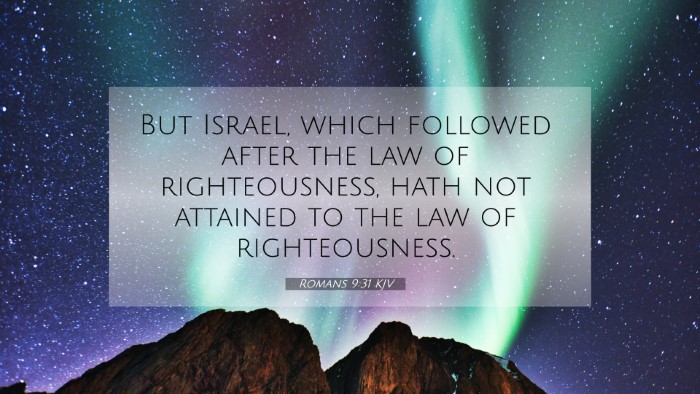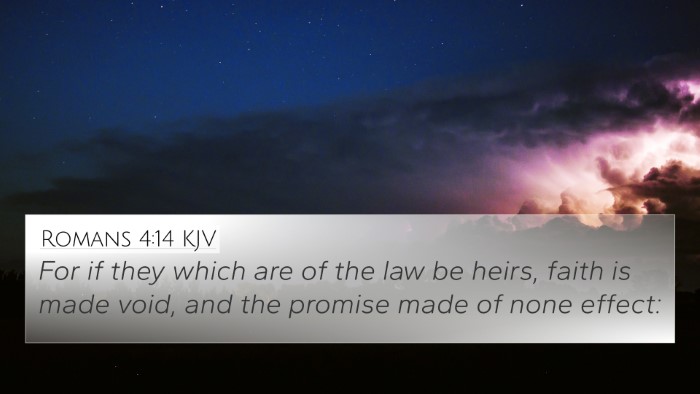Understanding Romans 9:31
Romans 9:31 states, "But Israel, which followed after the law of righteousness, hath not attained to the law of righteousness." This verse encapsulates the struggle of the Jewish people in their pursuit of righteousness through the law and highlights the broader theme of faith versus works in the Christian faith.
Summary of Insights
Meaning of the Verse
In this passage, Paul contrasts Israel's pursuit of righteousness through the law with the righteousness that comes through faith. Despite their diligent observance of the law, the Israelites failed to achieve the righteousness they sought because they did not approach it with faith, but rather with a reliance on their own efforts.
Commentary Insights
-
Matthew Henry emphasizes the futility of seeking righteousness through the law alone. He suggests that the law serves as a tutor leading to Christ, and without faith, one's efforts are in vain.
-
Albert Barnes notes that the Jews were zealous in following the law but missed the essence of faith that leads to true righteousness. He points out that the law was intended to direct them towards Christ, where righteousness is fully realized.
-
Adam Clarke remarks on the contrast between the 'pursuit' of righteousness and the 'attainment' of it. He explains that righteousness is not merely a result of obeying laws, but is a gift received through faith in Jesus Christ.
Bible Verse Cross-References
This verse finds numerous connections with other scriptures that explore the themes of righteousness, the role of the law, and faith. Here are some pertinent cross-references:
- Romans 3:20 - "Therefore by the deeds of the law there shall no flesh be justified in his sight: for by the law is the knowledge of sin."
- Galatians 2:16 - "Knowing that a man is not justified by the works of the law, but by the faith of Jesus Christ..."
- Philippians 3:9 - "And be found in him, not having mine own righteousness, which is of the law, but that which is through the faith of Christ..."
- Hebrews 11:6 - "But without faith it is impossible to please him: for he that cometh to God must believe that he is, and that he is a rewarder of them that diligently seek him."
- John 1:17 - "For the law was given by Moses, but grace and truth came by Jesus Christ."
- Matthew 5:20 - "For I say unto you, That except your righteousness shall exceed the righteousness of the scribes and Pharisees, ye shall in no case enter into the kingdom of heaven."
- Ephesians 2:8-9 - "For by grace are ye saved through faith; and that not of yourselves: it is the gift of God: Not of works, lest any man should boast."
Thematic Bible Verse Connections
Romans 9:31 connects deeply with the themes of faith and grace versus works and law. It invites a comparative study of Pauline epistles where the apostle Paul often reiterates that salvation is through faith in Christ, rather than adherence to the law.
Exploring Links Between Scriptures
Employing a Bible cross-reference guide, we can explore how various scripture passages align with the message Paul conveys in Romans 9:31. The concept of righteousness is a recurring motif that demands attention in both the Old and New Testaments.
Cross-Referencing Biblical Texts
When cross-referencing, it’s beneficial to identify connections between Old and New Testament texts. For instance, the teachings of the prophets often foreshadow the righteousness that would be fully revealed in Christ, aligning with Paul's discourse in Romans.
Comparative Study of Pauline Epistles
Analyzing other Pauline letters provides further insight into the tension between law and grace. In Galatians, Paul addresses the Judaizers who insisted on law adherence for salvation, paralleling the issues presented in Romans 9:31.
Conclusion
Romans 9:31 serves as a pivotal reminder of the transition from the law to grace in Christ. By employing tools for Bible cross-referencing and examining inter-Biblical dialogues, readers uncover the intricate web of scriptural themes regarding righteousness and faith.













